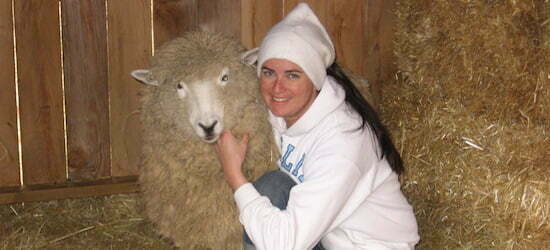ASAP likes to share the stories of people who help us fulfill our mission. This month we talk with farmer Stacey Thompson of Our Fiddlehead Farm in Haywood County, who will be presenting at the Business of Farming Conference on Feb. 22.
Why do you attend Business of Farming each year?
The networking and camaraderie of the Business of Farming Conference is so valuable. Farmers tend to be homebodies because we have to work, so we don’t get to talk to each other. ASAP also does a good job of having a pulse on trends in farming. I always come away with a nugget of inspiration or an idea that’s new and innovative. The workshops are small-farm-centric, not scaled to industrial or one-crop farms, so the content is applicable and realistic, not theoretical.
You’re presenting on a panel of CSA farmers. How has your CSA experience evolved over time?
This is our tenth year offering our CSA. It’s evolved organically as our family has. We used to attend midweek and weekend markets. As we added small children (the fiddleheads) to our clan, the midweek market became too much. That got me thinking about how we could adapt and change, and what we could do with midweek harvests. We landed on a CSA, which with one child I could deliver during nap time. Then we added more children, with different nap times, and moved to onsite pickup. We started with traditional model of pay up front, one size, you get what you get. Now we offer pay-as-you-go. That opened it up to SNAP/EBT families. We got to a point where our waitlist was as high as families we were serving. That led us to farm partnerships and a multi-farm model. We’ve been able to be very specific and strategic about what we’re doing, which has helped me have more confidence as we’ve changed.
What are some business concerns that you (or other farmers) have that are specific to farming?
There are a lot! As a small farming business, our biggest concern is reliable labor. Also, diversification of crops. Right now, hemp is really big. If you put all your eggs in that basket and at some point it reaches its plateau, will it still be worth it? There is a balance that shifts so much. Mandates and regulations, particularly federal and state. So often in reading them they sound like they contradict each other. Investors and loans. You can go into the bank with a best business plan, and they can say no. My business partner, the weather, is completely unpredictable and undependable.
How did you get into farming?
I spent all my summers on my family’s farm in Iowa. I gathered 30 dozen eggs a day; we milked in the morning and the afternoon, and I swore I would never be a farmer. But I went to Clemson and studied animal science and sociology. Farming allows me to do both. My husband and I both had real world jobs, but I wanted to get out of that rat race and wanted to work from home. We were going to the farmers market with excess produce from our market garden. That let me know this is viable. John Michael still works for a landscape supply company in Asheville because health insurance is a real concern. He helps with farm too, but I’m the main fixture. As we added children, all of that’s evolved.
Is the winter season a more restful time for you, or just as busy as other seasons?
Different is a good word. It’s more restful physically, but amped up mentally, emotionally, and logistically. We’re planning, doing financial projections for next year. Being a seasonal business, we have to keep in contact with our customers. There’s no guarantee we will see them in March unless I post to Instagram regularly or send monthly newsletters of what’s going on on the farm. But inherently winter is more restful. We get more sleep. We read seed catalogs by the wood stove.
Find out more about the Business of Farming Conference at asapconnections.org.

